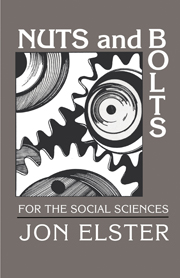Book contents
- Frontmatter
- Contents
- Preface and Acknowledgments
- Part One Introduction
- Part Two Human Action
- II Desires and Opportunities
- III Rational Choice
- IV When Rationality Fails
- V Myopia and Foresight
- VI Selfishness and Altruism
- VII Emotions
- VIII Natural and Social Selection
- IX Reinforcement
- Part Three Interaction
- Bibliographical Essay
- Index
IV - When Rationality Fails
Published online by Cambridge University Press: 05 June 2012
- Frontmatter
- Contents
- Preface and Acknowledgments
- Part One Introduction
- Part Two Human Action
- II Desires and Opportunities
- III Rational Choice
- IV When Rationality Fails
- V Myopia and Foresight
- VI Selfishness and Altruism
- VII Emotions
- VIII Natural and Social Selection
- IX Reinforcement
- Part Three Interaction
- Bibliographical Essay
- Index
Summary
RATIONAL-CHOICE theory aims at explaining human behavior. To achieve this, it must, in any given case, proceed in two steps. The first step is to determine what a rational person would do in the circumstances. The second step is to ascertain whether this is what the person actually did. If the person did what the theory predicted he would do, it can add the case to its credit side. Similarly, the theory can fail at each of the two steps. First, it can fail to yield determinate predictions. Second, people can fail to conform to its predictions – they can behave irrationally.
To explain how these problems arise, let me first summarize the main argument of chapter III. An action, to be rational, must be the final result of three optimal decisions. First, it must be the best means of realizing a person's desire, given his beliefs. Next, these beliefs must themselves be optimal, given the evidence available to him. Finally, the person must collect an optimal amount of evidence – neither too much nor too little. That amount depends both on his desires – on the importance he attaches to the decision – and on his beliefs about the costs and benefits of gathering more information. The whole process, then, can be visualized as depicted in Fig. IV. 1.
- Type
- Chapter
- Information
- Nuts and Bolts for the Social Sciences , pp. 30 - 41Publisher: Cambridge University PressPrint publication year: 1989
- 2
- Cited by



